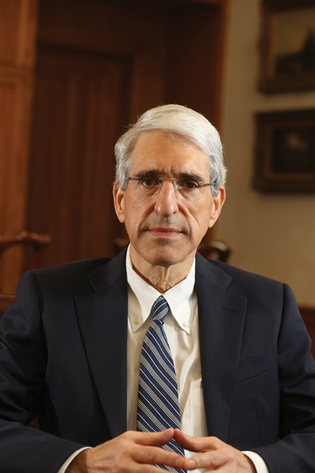
Mark Ostow
The Yale Alumni Magazine publishes a letter from President Peter Salovey ’86PhD in every issue. In this letter, the president discusses Israeli-Palestinian relations and how he and others are working to respond.
View full image
Dear Friends,
As I write this on the heels of Thanksgiving, I reflect with gratitude on my journey to becoming Yale’s president. So many mentors, peers, family members, and friends have modeled for me the qualities of a leader throughout my career, providing the opportunity to grow into this position. Many of them are part of the Yale community and have played vital roles in guiding our university through times of past turmoil.
Come July, I will have had the privilege of serving as a leader at Yale for over two decades, first as chair of the psychology department, later as dean and provost, and finally as president. During these years, I have come to appreciate how leadership is forged in the daily, sometimes seemingly inconsequential, decisions we make, such as stopping to listen to a colleague’s problems during a hectic day, considering a peer’s opposing viewpoint even when it elicits a strong emotional response, or inviting feedback on one’s work. There is no magic in these actions, but as Aristotle described, excellence is a habit formed by doing. He noted, “we learn an art or craft by doing the things that we shall have to do when we have learned it: for instance, [we] become builders by building houses, harpers by playing on the harp.” This applies to leadership as well.
Leadership is the natural result of a persistent focus on demanding the best in oneself and inspiring it in others. That is what Yale College, Yale Graduate School, and the professional schools impart to our students. Although we may not always teach leadership directly, we model the knowledge, skills, and actions that together make for an effective leader. These behaviors include being open to contrary opinions, listening to those with vastly different outlooks and experiences, asking questions that broaden our mindset, thinking critically when confronting complex issues, and acting with empathy and understanding.
At a time of bitter discord, political polarization, and growing conflict around the world, Yale’s emphasis on leadership is needed more than ever. The world would be advantaged by leaders who can work across divisions and find ways to help individuals and communities overcome entrenched differences. This requires earnest engagement with one another even on the most complex topics.
Consider Israeli-Palestinian relations. Since Hamas’s October 7th terrorist attack on Israeli civilians, including women and children, and the resulting war, students in our community have ex-perienced loss and grave uncertainty about the future. At Yale, we support those working toward peace, and we have renewed our resolve to focus on the safety and well-being of our students and other members of our community—and to promote civil, respectful discourse within it.
Yale students, faculty members, alumni, and staff have many different viewpoints, backgrounds, and cultures. We do not agree on everything, but as members of this community, we share a commitment to open, honest dialogue and respect for one another. So, across the university, we are teaching our students to be comfortable with disagreement, to welcome different perspectives, and to find common ground—vital skills for leadership and for peace.
I often focus on these themes in my writings and speeches. In recent weeks, I have spoken to Jewish and Muslim students about the alarming surge in antisemitic, Islamophobic, anti-Israel, anti-Palestinian, and anti-Arab sentiments across the world. I have made clear1 that antisemitism, Islamophobia, and hatred toward Palestinians and Israelis are emphatically against our values and principles at Yale, and that our forceful rejection of discrimination and prejudice must be matched by our will to act with compassion and civility. I called on students to listen to one another and to choose their words with care and consideration.
Yale College dean Pericles Lewis is hosting a series of “Dean’s Dialogues,” which bring together students in the Yale Schwarzman Center for conversations on key issues. These conversations involve faculty members and other experts and cover pressing and potentially polarizing topics. In November, for example, Dean Lewis hosted a conversation with two faculty members with different perspectives on the Hamas-Israel war. Also in November, Jeffrey Sonnenfeld, senior associate dean for leadership studies at the School of Management and Lester Crown Professor in the Practice of Management, convened a discussion2 of paths to peace with ambassadors from Israel and the United Arab Emirates and other experts.
These conversations model civil discourse between members of the university community or guests with different points of view, even vastly different historical narratives. At these events and in other moments every day on campus, I see many students exhibiting leadership by listening critically and speaking with compassion, even when some of their peers do not. I think, for instance, of Justin Crosby’s opinion piece in the Yale Daily News “For empathy.”3 He wrote, “We, as members and stewards of this community, need to be at the forefront of crafting grassroots mechanisms of discourse.”
In these past two months, I have seen colleagues and students demonstrate steadfast commitment to Yale’s mission of educating future leaders who serve all sectors of society. At a time when many parts of the world are in turmoil, I am grateful that so many of our students are practicing daily some of the most valuable skills of leadership: the ability to transcend differences and engage with one another even when we disagree vehemently on a matter as serious as life and death.
With my warmest wishes,
Peter Salovey ’86PhD
President
Chris Argyris Professor of Psychology
1 https://president.yale.edu/president/speeches/presidents-remarks-compassion-and-civility
2 https://som.yale.edu/story/2023/chief-executive-leadership-institute-convenes-uae-and-israeli-ambassadors-dialogue-paths
3 https://yaledailynews.com/blog/2023/11/09/crosby-for-empathy/
 loading
loading